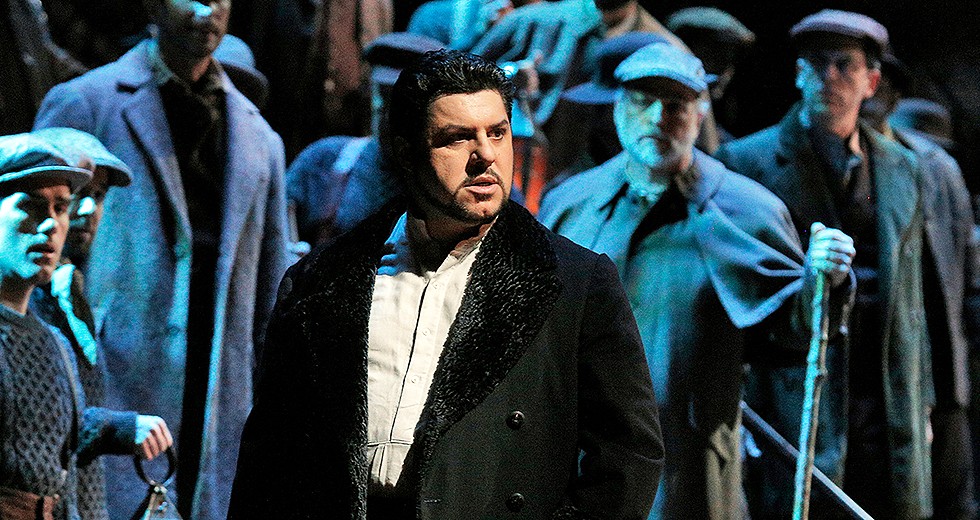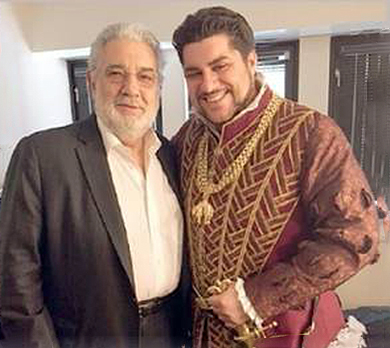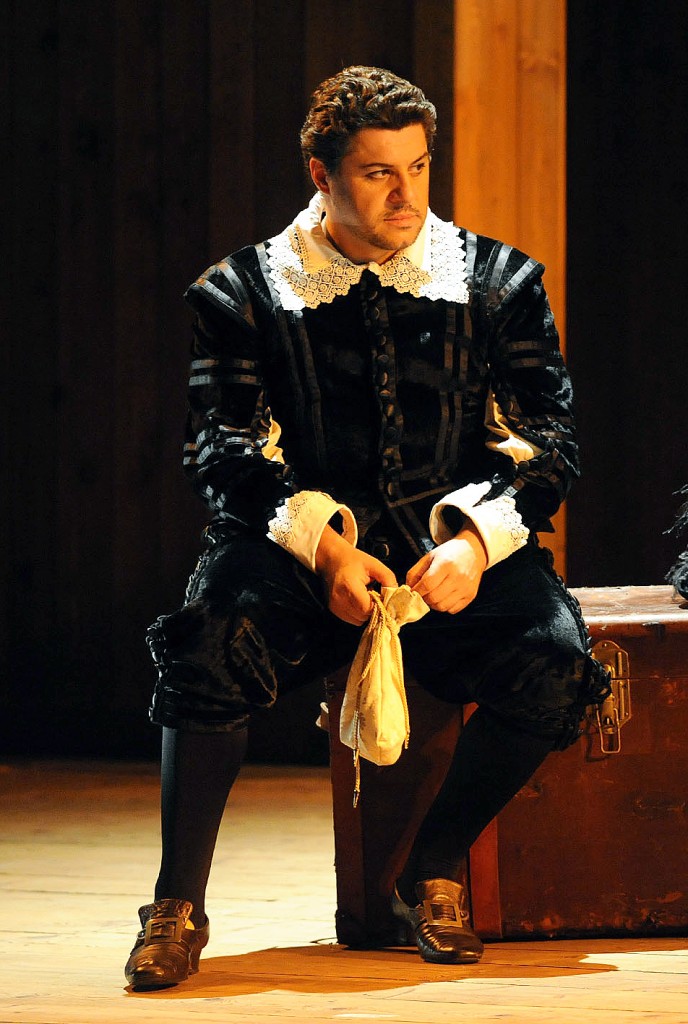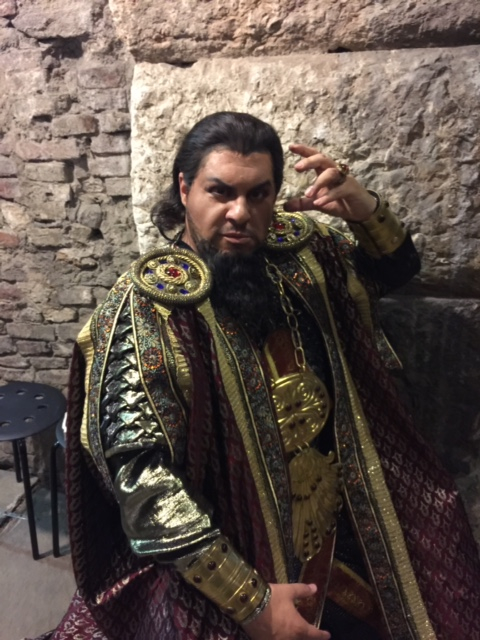
In April 2015, Italian baritone Luca Salsi made history by becoming just the third artist to sing two leading roles in one day at the Metropolitan Opera. His feat could have doubled for an operatic subplot itself: A mere 30 minutes before the curtain went up April 4 on the Met’s performance of Verdi’s Ernani — which would be broadcast to radio audiences worldwide — Salsi received a “Superman”-like request. Could he come to the rescue and replace an ailing superstar? And not just any superstar: Super tenor Placido Domingo, now in the baritonal phase of his remarkable career, who had been singing the role of Don Carlo. Suffering from a cold, Domingo decided at the last minute that he could not perform in the highly anticipated matinee.
Already scheduled to perform as Enrico at the Met that night in Donizetti’s Lucia di Lammermoor, Salsi agreed to sing Don Carlo in Ernani for the matinee, even though he had not rehearsed the Verdi part at the Met and had last sung the role more than a year ago. That performance was in December 2013 at the Rome Opera, led by conductor Riccardo Muti, music director of the Chicago Symphony Orchestra. “When you do something with Maestro Muti, [afterward] you will remember very well the score,” Salsi said in an interview with the Associated Press.
This summer, Salsi reunites with Muti for two concert performances of Ernani at the Salzburg Festival. In September 2013, Salsi was a standout in the title role of the CSO’s concert performances of Verdi’s Macbeth, under Muti, and he will return to Symphony Center for Verdi’s Falstaff, again conducted by Muti, for three performances April 21-26.
As for his last-minute heroics at the Met, Salsi admits it was “pretty fun.” The day before, Peter Gelb, the Met’s general manager, had called Salsi to apprise him of the situation. “He asked me if I knew Ernani, and I said yes because I had done it with Muti in Rome,” Salsi said in an interview a few weeks after his Met triumph. “When you sing with Muti, you never forget, because you learn the part so deeply. Muti is the best in the world [when comes to helping singers prepare a role]. He makes you understand why the work really says something to you when you are singing. It’s not just for the notes but for the meaning of the phrases, the emotions.” Thanks to his work with Muti, Salsi said, “I just had to open the score that day at the Met, and I remembered everything again in five minutes.”
Still, he was surprised when he got the fateful phone call. Gelb had told him that they would let him know by 10 a.m. of Domingo’s status. “At 10 a.m., Placido was still on,” Salsi recalled. “They told me, ‘It’s OK, you can relax for tonight.’ I had planned to walk around and then take a nap, because that night I would be singing Enrico in Lucia.”
So he left his quarters and went outside for a stroll. By 12:30 p.m., he had reached 74th Street, nine blocks to the north of Lincoln Center, the Met’s home, when Alvaro Domingo, Placido’s son, called and told Salsi that “‘Dad doesn’t feel well; he feels he can’t sing today.’ Then I started to run, arriving at the Met by 12:45. Four people put the costume on me, it fit! Incredible. I try to warm up. The phone rings, here’s Jimmy [the Met’s legendary music director, who was conducting Ernani]. It was like a dream. He’s another great, and I would be singing with him for the first time. I told him I would do my best. Thank god, it was very good. My fear was that I would finish Ernani at 4:30, and by the time for Lucia four hours later, I feared the energy would have gone down. So I went to a restaurant to eat a big American meal, hamburger and french fries. I walked a little and then it was back to the Met.”
Those who heard the Met broadcast can confirm that Salsi was more than very good, he scored a triumph. “Mr. Salsi is a real Verdi baritone! His voice is perfect for such roles,” wrote one listener in the comments section of a New York Times report about Salsi’s Met double-header. “He follows the great tradition of baritones with real dramatic color in their voices. Think of Tito Gobbi, Ettore Bastianini, Mario Sereni, et al. The Met had better sign him to a long-term contract with bonuses. He is the first baritone star in a long time!! He sings Posa in Don Carlo this week [Salsi sang the last two performances of the Met’s April run of this opera]. Three great roles in one week. The Ernani audience doesn’t know how fortunate they were to have a real baritone in one of Verdi’s greatest roles.”
Still, Salsi must have been worried about subbing for Domingo and potentially disappointing his many fans. “Actually, I didn’t have any time to be nervous, or think about what could happen,” Salsi said. “At 15 minutes before, what can you do? When they announced [the substitution], I heard from my dressing room the groans, but what can you do? I knew I would try to do my best in an opera I knew very well.” With a laugh, he added, “I thought it was pretty good. I’m happy about my performance.”
Chicago audiences last saw Salsi in the title role of Rossini’s William Tell, presented in a touring concert version by the Teatro Regio Torino of Turin, Italy, last December at the Harris Theater for Music and Dance. In his review for the Sun-Times, Andrew Patner wrote: “Italian baritone Luca Salsi summoned up the darkness and complexity of his recent Macbeth with Muti and the Chicago Symphony Orchestra in the Verdi opera, and captured the Hans Sachs-like nature of his character, the legendary liberator of Switzerland from Austrian Habsburg oppression.” John von Rhein in the Chicago Tribune observed: “Baritone Luca Salsi, well remembered for his Macbeth in Muti’s Chicago Symphony performances of the eponymous Verdi opera in 2013, brought firm baritonal strength and authority to Tell’s bellicose calls-to-arms.”
Muti is a great exponent of the rarely staged William Tell, and Salsi agrees that the opera should be heard more often. “William Tell was for Rossini like Falstaff was for Verdi. We see both composers advancing the search for new music,” Salsi said. “In William Tell, there are many moments that influenced what was to come in opera. Falstaff is like a step from Verdi to what is to come with Puccini and new music in the new century.”
Perhaps one day he might work with Muti in a staging of William Tell. “Yes, that would be great,” Salsi said. “Every time I sing with him, it’s so wonderful. He knows so deeply the music. In just in one phrase, you know more than in a whole opera with another conductor. I love to work with him.”
At 40, Salsi already has added more than half of Verdi’s 28 operas to his repertoire. “My dream now is to sing Simon Boccanegra,” he said. “It’s not just a beautiful role for the baritone, it’s also a wonderful role where you can play with words and emotions. In the end, in our jobs as opera performers, we don’t have just to sing well, we have to bring the emotion to the audience. That’s the most important point for me. A lot of singers can sing well, but if you can arrive with one phrase, with one note, it’s different. You’re an artist, not just a singer. Macbeth, Simon Boccanegra and Iago in Otello are roles like that.”
Though many regard Falstaff as Verdi’s finest opera, Salsi prefers Macbeth and Simon Boccanegra. “Singing Macbeth was a dream at the CSO. It’s the best role a baritone can do in his career, because the music is just right for a baritone,” said Salsi, who will sing the title role of Macbeth, again under Muti, at the Royal Stockholm Philharmonic for two concert performances May 15 and 17. “Sometimes in opera you sing just to show your voice but in Macbeth, you have to be ready to play with the words. It’s wonderful … all the concertino. But then, all Verdi is wonderful. I’m from Parma, I have Verdi in my blood.”
When Salsi returns to the CSO next spring in Falstaff, he will sing the role of Ford, the put-upon wealthy husband who believes his wife is consorting with the rogue knight of the opera’s title. For Salsi, Ford is not a villain and not merely a foil to Sir John Falstaff. “I try to sing the role more in the true Verdi style,” he said. “It’s easy to do the character wrong by over-singing. So I try to keep just the right style. Vocally, Ford is very difficult to sing, more so than Falstaff. The last phrase of his aria [È sogno o realtà?/”Is it a dream or reality?”] goes from B flat to high G. It has many vocally difficult moments. But the character is close to me. He’s a jealous man, I’m a jealous man,” he added with a laugh.
Though some baritones view Ford as a lesser part, Salsi feels otherwise. “I think È sogno o realtà? is the one of best arias that Verdi ever wrote,” he said. “It’s very dramatic for the voice and in the music. Falstaff gets all the attention but Ford is really the character who drives the much of the action.”
On whether he might want to take on the title character in the future, Salsi said, “I can sing Falstaff but I don’t feel it’s my character now. Maybe one day. Now I feel more at home in the other role. But maybe one day, sure, why not?”
And maybe he might even sing it at Lyric Opera of Chicago, where he has yet to make his debut. “I would love to perform there,” he said. “I hope they will invite me, I love Chicago, the city itself, and now the audience knows me. I hope I can come there. I love to sing in the United States. I will come back to sing at Washington Opera in 2017, and then at the Met, we are still deciding but I have promises to come back.”
TOP: Luca Salsi as Enrico in Donizetti’s Lucia di Lammermoor at the Met earlier this year. | Photo: Met Opera


